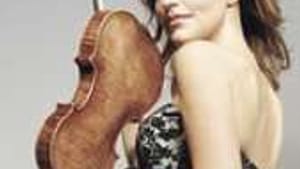Stay in the Loop
BSR publishes on a weekly schedule, with an email newsletter every Wednesday and Thursday morning. There’s no paywall, and subscribing is always free.
Back to the future with Yannick and Anne-Sophie
Philadelphia Orchestra’s Tchaikovsky opening

This isn’t an anniversary year for Tchaikovsky. Nor is it a time when Americans feel warmly about Russia. So it seems an odd coincidence that the Philadelphia Orchestra opened its season with an all-Tchaikovsky program just two nights after the Metropolitan Opera started its year with a new production of Tchaikovsky’s Eugene Onegin.
In Manhattan, demonstrators protested the Putin regime’s anti-gay laws, especially since the opera’s two biggest stars had publicly supported Putin’s presidential campaign.
Philadelphia’s opening, by contrast, lacked political overtones. Yannick Nézet-Séguin is French Canadian and the violinist Anne-Sophie Mutter is German. Apparently they picked Tchaikovsky just because he’s a popular favorite.
”˜Robbed time’
Mutter enjoys a reputation as a proponent of contemporary compositions, but here she selected a late-19th-Century concerto and interpreted it in the style of that era. If you closed your eyes, you might have guessed this was a performance by Mischa Elman, one of the earliest violin greats, who similarly popularized classical violin with his recordings, films and broadcasts until his death in 1967. Elman played with prolific sliding into and out of tones (portamento) and with rhythmic freedom (rubato), where he elongated phrases that he considered to be so beautiful that the audience would enjoy hearing them prolonged.
In the romantic period, rubato was used generously. It literally means "robbed time," and duration taken from one section was given to another. Accordingly, Mutter and Nézet-Séguin gave great rapidity to the endings of the first and third movements of Tchaikovsky’s Violin Concerto.
Such slowing down and speeding up, and the scooping in and out of notes, hasn’t been in favor in recent times, yet Mutter embraced the style, playing ultra-expressively and endearingly old-fashioned. Some moments were excessive, with her volume diminishing to the vanishing point and the music sometimes almost coming to a complete stop.
Dubious light show
Yannick presented a nuanced interpretation of Tchaikovsky’s Marche Slav, with its juxtaposition of Serbian folk songs and the Russian national anthem of the time, "God Save the Tsar." The piece was commissioned during the Serbo-Turkish war of 1876-1878, when Russia supported the Serbs.
In the Romeo and Juliet Fantasy, the climaxes were loud but there was a welcome contrast of lyrical playing. The Philadelphians didn’t attempt the full-out lush sound of the Ormandy era, when the strings swamped every other section.
The program was accompanied by a light show, with the Kimmel’s organ pipes bathed alternately in red, yellow, pink-purple and light blue, and sometimes the lights swirled across the Verizon Hall ceiling. I don’t know if this gimmick will be repeated during the coming season. Nor would I want to see it frequently.
In Manhattan, demonstrators protested the Putin regime’s anti-gay laws, especially since the opera’s two biggest stars had publicly supported Putin’s presidential campaign.
Philadelphia’s opening, by contrast, lacked political overtones. Yannick Nézet-Séguin is French Canadian and the violinist Anne-Sophie Mutter is German. Apparently they picked Tchaikovsky just because he’s a popular favorite.
”˜Robbed time’
Mutter enjoys a reputation as a proponent of contemporary compositions, but here she selected a late-19th-Century concerto and interpreted it in the style of that era. If you closed your eyes, you might have guessed this was a performance by Mischa Elman, one of the earliest violin greats, who similarly popularized classical violin with his recordings, films and broadcasts until his death in 1967. Elman played with prolific sliding into and out of tones (portamento) and with rhythmic freedom (rubato), where he elongated phrases that he considered to be so beautiful that the audience would enjoy hearing them prolonged.
In the romantic period, rubato was used generously. It literally means "robbed time," and duration taken from one section was given to another. Accordingly, Mutter and Nézet-Séguin gave great rapidity to the endings of the first and third movements of Tchaikovsky’s Violin Concerto.
Such slowing down and speeding up, and the scooping in and out of notes, hasn’t been in favor in recent times, yet Mutter embraced the style, playing ultra-expressively and endearingly old-fashioned. Some moments were excessive, with her volume diminishing to the vanishing point and the music sometimes almost coming to a complete stop.
Dubious light show
Yannick presented a nuanced interpretation of Tchaikovsky’s Marche Slav, with its juxtaposition of Serbian folk songs and the Russian national anthem of the time, "God Save the Tsar." The piece was commissioned during the Serbo-Turkish war of 1876-1878, when Russia supported the Serbs.
In the Romeo and Juliet Fantasy, the climaxes were loud but there was a welcome contrast of lyrical playing. The Philadelphians didn’t attempt the full-out lush sound of the Ormandy era, when the strings swamped every other section.
The program was accompanied by a light show, with the Kimmel’s organ pipes bathed alternately in red, yellow, pink-purple and light blue, and sometimes the lights swirled across the Verizon Hall ceiling. I don’t know if this gimmick will be repeated during the coming season. Nor would I want to see it frequently.
What, When, Where
Philadelphia Orchestra opening night. Tchaikovsky, Marche Slav; Violin Concerto in D major; Romeo and Juliet Fantasy-Overture; Polonaise from Eugene Onegin (encore). Anne-Sophie Mutter, violin; Yannick Nézet-Séguin conductor. September 25, 2013 at Verizon Hall, Kimmel Center, Broad and Spruce St. (215) 893-1999 or www.philorch.org.
Sign up for our newsletter
All of the week's new articles, all in one place. Sign up for the free weekly BSR newsletters, and don't miss a conversation.

 Steve Cohen
Steve Cohen